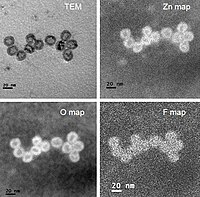
Photo from wikipedia
Abstract SARS‐CoV‐2 and other respiratory viruses spread via aerosols generated by infected people. Face masks can limit transmission. However, widespread use of disposable masks consumes tremendous resources and generates waste.… Click to show full abstract
Abstract SARS‐CoV‐2 and other respiratory viruses spread via aerosols generated by infected people. Face masks can limit transmission. However, widespread use of disposable masks consumes tremendous resources and generates waste. Here, a novel material for treating blown polypropylene filtration media used in medical‐grade masks to impart antimicrobial activity is reported. To produce thin copper@ZIF‐8 core‐shell nanowires (Cu@ZIF‐8 NWs), Cu NWs are stabilized using a pluronic F‐127 block copolymer, followed by growth of ZIF‐8 to obtain uniform core‐shell structures. The Cu@ZIF‐8 NWs are applied to filtration media by dip coating. Aerosol filtration efficiency decreases upon exposure to ethanol (solvent for dip‐coating), but increases with addition of Cu@ZIF‐8 NWs. Cu@ZIF‐8 NWs shows enhanced antibacterial activity, compared to Cu NWs or ZIF‐8 alone, against Streptococcus mutans and Escherichia coli. Antiviral activity against SARS‐CoV‐2 is assayed using virus‐infected Vero E6 cells, demonstrating 55% inhibition of virus replication after 48 h by 1 µg of Cu@ZIF‐8 NWs per well. Cu@ZIF‐8 NWs’ cytotoxicity is tested against four cell lines, and their effect on inflammatory response in A549 cells is examined, demonstrating good biocompatibility. This low‐cost, scalable synthesis and straightforward deposition of Cu@ZIF‐8 NWs onto filter media has great potential to reduce disease transmission, resource consumption, and environmental impact of waste.
Journal Title: Advanced Functional Materials
Year Published: 2020
Link to full text (if available)
Share on Social Media: Sign Up to like & get
recommendations!